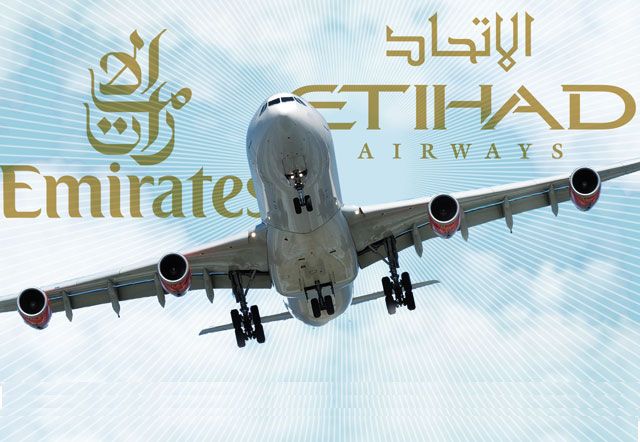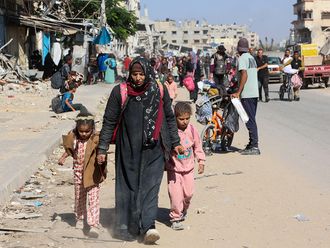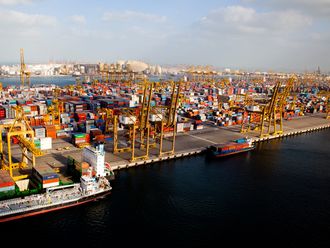In May 2008, I wrote an article titled ‘One day there will be just a single city: Abu Dubai', in which I argued that the two cities would eventually become one integrated metropolis as they are too geographically close for anything else to happen.
Seventeen months later, Ahmad Bin Shabib, a friend of mine, posted the following on twitter: "Etihad and Emirates should merge and be called Etihad Emirates." I retweeted it immediately and replied to him: "HQ at the new Jebel Ali Airport complex".
Understandably, there is a lot of confusion and sensitivity about the sale of assets on Dubai's part. Equally, there is a lack of clarity on Abu Dhabi's part on how it can support and benefit from this process. The idea of selling assets still seems to be at the bottom of the agenda of Dubai's restructuring options; one can only wonder if a proposal for a merger of any kind would make it to the document at all.
Yet, despite all of this, the Emirates and Etihad conversation is still fathomable. It is an obvious win-win situation. Here are a few, of many more, reasons why:
• Emirates has 127 aircraft and 153 on its order book while Eithad has 46 aircraft and 205 on its order book, which means they will have 280 and 251 respectively. The combination of the fleets would make it the world's fourth largest airline by aircraft fleet.
• Emirates flies to over 100 destinations and so does Etihad, when you account for its code share destinations as well. They both service similar destinations and so a merged entity would be able to fly to even more destinations.
• Having one large airline in the country with a large airport complex such as Jebel Ali Airport would allow it to negotiate new routes from a much stronger stand point.
• The proximity to Jebel Ali Seaport would fundamentally transform the cargo business, allowing for the development of a mixed use hub where air freight and sea freight solutions can be creatively developed according to a cost and time matrix.
Yet the rationale for Emirates and Etihad to merge is more than just synergy. It is about bringing together two airlines that were set up to promote their respective cities and signalling a shift in the mentality of defining where one city ends and the other begins.
The UAE's area codes are 02 for Abu Dhabi, 03 for Al Ain, 04 for Dubai, 05 for mobile, 06 for Sharjah and Ajman, 07 for Umm Al Quwain and Ras Al Khaimah, 08 is the Western Region (Liwa, etc.) and 09 is Fujairah. Yet where is 01? When the UAE was found in 1971, its Constitution was temporary and its interim capital was Abu Dhabi. Very few people recall that there was a plan for a city to be built between Abu Dhabi and Dubai named ‘Al Karama' that would be the capital of the UAE. Al Karama was meant to have the 01 area code. Of course this never happened since the UAE's Constitution was ratified and Abu Dhabi was recognised as the permanent capital of the nation in 1994, with few changes, except the omission of the Al Karama clause.
Collaboration
We have seen how successful collaborations can be through the Emal project (an aluminium smelter joint venture between Dubal, a Dubai based aluminium smelter, and Mubadala, an Abu Dhabi government investment firm). What we hope to see is a complete merger of Emal and Dubal one day with the Investment Corporation of Dubai and Mubadala remaining as direct shareholders.
Emirates and Etihad could lead the way in this neo-federal school of thought. It would create a global player as opposed to, despite how both groups like to position themselves, regional giants.
It is quite easy to imagine a merged entity headquartered in Jebel Ali's International Airport, thereby creating a magnet that would bring the two metropolises, both geographically and strategically, closer together. Close your eyes, throw in a high-speed train that transports people to central Dubai, Yas Island and Abu Dhabi Island and consider Abu Dhabi's plans to move the federal government and its state institutions off Abu Dhabi Island and onto the mainland at what will be known as Capital District (near Musaffah) — it is not that unrealistic, right? Jebel Ali Airport would be renamed as Zayed International Airport and the distance between the Capital District and Jebel Ali would be less than 80 kilometres. The distance in between would be easily filled by the expansion of existing industries and related accommodations and services, thus bridging the gap along the empty highway on the trip from Abu Dhabi to Dubai. This would be the ideal time to transform calls for integration from rhetoric to a measurable step towards strengthening the federation in a logical manner that benefits all and weakens none.
Abu Dhabi remains our capital and the 01 code transforms into a code of conduct from Fujairah to Liwa.
Mishaal Al Gergawi is an Emirati commentator on socio-economic and cultural affairs in the UAE.










